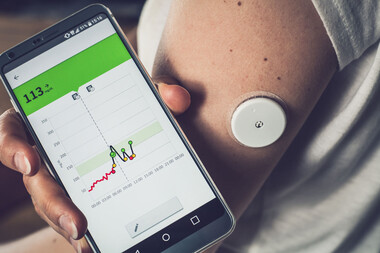
In Germany, about 7.2 percent of adults aged 18 to 79 suffer from diabetes mellitus. About 90 to 95 percent of them have type 2 diabetes. According to the Federal Ministry of Health, education and prevention are the decisive factors in the fight against diabetes. Accordingly, a new study gives hope that it is possible to protect oneself from type 2 diabetes. People who start eating before 8.30 a.m. had lower blood sugar levels and lower insulin resistance, which could reduce the risk of developing type 2 diabetes.
Diabetes has become a dangerous widespread disease that can often be fatal. This is because organs, blood vessels and nerves can be so damaged by the metabolic disease that heart attacks, strokes, kidney weakness, retinal damage and nerve disorders as well as numerous other threatening diseases can be the result. The numbers are alarming: there are currently more than seven million people with diabetes in Germany. This is an increase of 38 percent since 1998, and more than 500,000 new cases are diagnosed every year. And worldwide, more than 425 million people now suffer from diabetes, which is almost triple the number in 2014. Or to put it another way: this means that one in eleven people worldwide has diabetes, and by 2045 there will be around 630 million patients, experts estimate.
In short, diabetes mellitus (diabetes) is an umbrella term for various metabolic disorders, according to the Federal Ministry of Health. "What they all have in common is that they lead to elevated blood sugar levels because the patients have a deficiency of the hormone insulin and/or the insulin effect is reduced. The main forms are type 1 and type 2 diabetes mellitus. In Germany, about 7.2 percent of adults aged 18 to 79 suffer from diabetes mellitus. Approximately 90 to 95 percent of them have type 2 diabetes.
Type 2 diabetes: Different therapy components are available
While type 1 diabetes is caused by an absolute deficiency of the hormone insulin and is so far incurable, so that patients have to inject insulin throughout their lives, type 2 diabetes is caused on the one hand by a reduced sensitivity of the body's cells to insulin (insulin resistance), and on the other hand, years of overproduction of insulin leads to an "exhaustion" of the insulin-producing cells. "Besides a hereditary predisposition, obesity and lack of exercise are considered to be the most important causes of type 2 diabetes. There are various therapy components available. First of all, regular exercise, an adapted diet and a normal body weight are most important," explains the Federal Ministry of Health.
Breakfast before 8.30 a.m. for lower blood sugar levels
According to the Federal Ministry of Health, education and prevention are the decisive factors in the fight against diabetes. Accordingly, a new study gives hope that it is possible to protect oneself against type 2 diabetes. People who start eating before 8.30am had lower blood glucose levels and lower insulin resistance, which could reduce the risk of developing type 2 diabetes, according to the study presented at the ENDO 2021 annual meeting of the Endocrine Society, the international medical organisation in the field of endocrinology and metabolism.
"We found that people who started eating earlier in the day had lower blood glucose levels and lower insulin resistance, regardless of whether they limited their food intake to less than 10 hours a day or spread their food intake over more than 13 hours a day," lead researcher Marriam Ali, M.D., of Northwestern University in Chicago, is quoted as saying in the press release. The background: "Because of the increase in metabolic disorders such as diabetes, we wanted to expand our understanding of dietary strategies to address this growing problem," Marriam Ali points out. Previous studies have shown that time-restricted eating, which consolidates eating to a shortened time frame per day, has consistently improved metabolic health. So the research team wanted to know if eating earlier in the day affected metabolic measures.
Insulin resistance was higher with shorter eating interval durations
The researchers analysed data from 10,575 adults who participated in the National Health and Nutrition Examination Survey to determine whether the duration and timing of eating were associated with fasting blood glucose levels and estimated insulin resistance. Fasting blood glucose levels did not differ significantly between the eating interval groups. Insulin resistance was higher for shorter eating interval durations, but lower for all groups with an eating start time before 8:30 am.
The researchers divided the participants into three groups depending on the total duration of eating: less than ten hours, ten to 13 hours and more than 13 hours per day. They then formed six subgroups based on the start time of the meal duration (before or after 8:30 am). Insulin resistance was higher for shorter meal interval durations, but lower in all groups that started eating before 8:30am. According to the researchers, these results suggest that timing is more strongly associated with metabolic measures than duration.
By the way, sugar consumption is highly relevant in the prevention of diabetes. There is a direct connection between this, obesity and type 2 diabetes, as a study within the framework of the "German Health Report Diabetes 2017" points out. In short, one of the results is that study participants who consumed more than 250 millilitres of a sugary drink per day had about a 1.8-fold higher risk of developing diabetes in the next five years than participants who consumed less than 250 millilitres per week. Since sugary drinks cause weight gain, it must be expected that the weight gain increases the diabetes risk accordingly, the authors write.
Avoid sugar substitutes and sweeteners
Especially since sugar also poses other huge risks beyond diabetes. Another study found that people whose sugar consumption was more than 21 per cent (about 105 grams) of their daily calorie intake had a 2.4-fold higher risk of mortality from cardiovascular disease. Sugar substitutes and sweeteners should also be avoided, as they promote cravings and obesity when consumed in larger quantities. The best thirst quenchers are water and unsweetened herbal teas.
Through a professional and individually adapted change in diet, patients can prevent a disease such as diabetes and even positively influence its course. Medications can also be reduced or even discontinued. It is important to find the right way of nutrition based on the respective health needs and challenges. Because it often takes an impulse from outside to change something. And of course the knowledge of what exactly to do.
This text may contain translation errors as the translation was done by
an online translation tool.










